Divine Comedy + Decameron discussion

This topic is about
The Divine Comedy
Art in and Inspired by the Commedia
Karinip wrote: "I am new here and don't know how you "do it"!
but I have checked out my "library".
Thanks Karnip for bringing the Danteum to our attention.
1. Danteum, 1938
Pietro Lingeri and Giuseppe Terragni
I found this:
Beautiful and powerful, the works in Ian Friend’s recent exhibition respond to romantic ideals of archtiecture and the work of Giuseppe Terragni.The exhibition collates works Friend produced in the mid-1990s, in response primarily to Giuseppe Terragni and Pietro Lingeri’s unrealized Danteum in Rome (1938).
The Danteum was to be a centre and museum to celebrate the writings of the thirteenth-century poet Dante Alighieri, a primary source of Mussolini’s political aspirations for Italy. Terragni and Lingeri’s design emerged directly from Dante’s poetic spaces of Paradiso, Purgatorio and Inferno as outlined in his The Divine Comedy
http://architectureau.com/articles/ex...
The exhibition collates works Friend produced in the mid-1990s, in response primarily to Giuseppe Terragni and Pietro Lingeri’s unrealized Danteum in Rome (1938).
http://www.formz.com/jointstudy/JS200...
In 1938 the president of the Società Dantesca Italiana, an industrialist, and two architects made a presentation to Benito Mussolini. Their proposal was to build a Danteum in in time for the planned upcoming Esposition of 1942 in Rome, a museum, library, and homage to the great Italian poet whose works had been appropriated by the Italian Fascist government, in time for the planned upcoming Esposition of 1942. One of the architects was Giuseppe Terragni.
http://paperarch.wordpress.com/the-da...
some visuals: http://web.tiscali.it/archiborgna/Ter...
but I have checked out my "library".
Thanks Karnip for bringing the Danteum to our attention.
1. Danteum, 1938
Pietro Lingeri and Giuseppe Terragni
I found this:
Beautiful and powerful, the works in Ian Friend’s recent exhibition respond to romantic ideals of archtiecture and the work of Giuseppe Terragni.The exhibition collates works Friend produced in the mid-1990s, in response primarily to Giuseppe Terragni and Pietro Lingeri’s unrealized Danteum in Rome (1938).
The Danteum was to be a centre and museum to celebrate the writings of the thirteenth-century poet Dante Alighieri, a primary source of Mussolini’s political aspirations for Italy. Terragni and Lingeri’s design emerged directly from Dante’s poetic spaces of Paradiso, Purgatorio and Inferno as outlined in his The Divine Comedy
http://architectureau.com/articles/ex...
The exhibition collates works Friend produced in the mid-1990s, in response primarily to Giuseppe Terragni and Pietro Lingeri’s unrealized Danteum in Rome (1938).
http://www.formz.com/jointstudy/JS200...
In 1938 the president of the Società Dantesca Italiana, an industrialist, and two architects made a presentation to Benito Mussolini. Their proposal was to build a Danteum in in time for the planned upcoming Esposition of 1942 in Rome, a museum, library, and homage to the great Italian poet whose works had been appropriated by the Italian Fascist government, in time for the planned upcoming Esposition of 1942. One of the architects was Giuseppe Terragni.
http://paperarch.wordpress.com/the-da...
some visuals: http://web.tiscali.it/archiborgna/Ter...
 Hola,
Hola,Someone (I forgot who) mentioned the Palacio Barolo, in Buenos Aires; the architect was a fan of the Divina Commedia. Here's a link; I apologize, but this portion of the webpage is only available in Spanish. Of course, Wikipedia has a site, too.
my link text
 For Salvidor Dali's illustrations for each Canto, try here:
For Salvidor Dali's illustrations for each Canto, try here:http://www.lockportstreetgallery.com/...
http://www.lockportstreetgallery.com/...
French Edition - 1963?
http://www.lockportstreetgallery.com/...
Soul searching? (The reign of the penitents)

http://www.princeton.edu/~dante/ebdsa...
Some comments on the Dali illustrations.
An upcoming exhibition in Frankfurt/Main in Germany
Heaven, Hell, Purgatory revisited by Contemporary African Artists
The Divine Comedy
21 March – 27 July 2014
http://www.mmk-frankfurt.de/en/ausste...
Heaven, Hell, Purgatory revisited by Contemporary African Artists
The Divine Comedy
21 March – 27 July 2014
http://www.mmk-frankfurt.de/en/ausste...
 Karinip wrote: "An upcoming exhibition in Frankfurt/Main in Germany
Karinip wrote: "An upcoming exhibition in Frankfurt/Main in GermanyHttp://www.mmk-frankfurt.de/en/auss..."
Thx, Karinip! What an opportunity! Hope some one or more of our participants here has a chance to see this exhibition and will tell us about the experience!
Has anybody mentioned Claudia Rogge,yet?
http://www.claudia-rogge.de/works/los...
http://www.arte.tv/de/6600428.html
http://www.claudia-rogge.de/works/los...
http://www.arte.tv/de/6600428.html
 This is a link the one of the above websites but I thought I would point it out. Blake's Illustrations to Dante's "Divine Comedy
This is a link the one of the above websites but I thought I would point it out. Blake's Illustrations to Dante's "Divine Comedy
 @9 Green Troll wrote: "This is a link the one of the above websites but I thought I would point it out. Blake's Illustrations to Dante's "Divine Comedy"
@9 Green Troll wrote: "This is a link the one of the above websites but I thought I would point it out. Blake's Illustrations to Dante's "Divine Comedy"This first seems to be the same as your link, Green Troll. What follows is basically a repeat of a comment I made elsewhere on these threads.
Here is the most complete online archive of Blake drawings associated with The Commedia that I have found. Unfortunately, they are not always clearly linked with a specific canto. (There is often, but not always, a notation on the illustration itself.)
http://www.blakearchive.org/exist/bla...
There is also a supplementary collection at an Australian site which includes at least a few not found above:
http://www.ngv.vic.gov.au/col/tools/c...
 Here is a set of images for The Commedia produced by Ivo David, a contemporary Italian artist:
Here is a set of images for The Commedia produced by Ivo David, a contemporary Italian artist:http://www.ivodavidfineart.com/Divine...
Most of the thumbnails will enlarge by clicking on them.
I have never been successful in accessing all of the descriptive material.
Here is a link for the artist:
http://www.ivodavidfineart.com/Bio.html
 ReemK10 (Paper Pills) wrote: "Karinip wrote: "This might be a start.
ReemK10 (Paper Pills) wrote: "Karinip wrote: "This might be a start.http://www.worldofdante.org/gallery_m..."
A rather good one! ..."
A very good one! Let me call out some of the subsections, since it took me awhile to become aware of them my first thorough read of The Commedia.
Yates Thompson at the British Library -- "...one of the finest Italian illuminated manuscripts of the Comedy. The codex was produced in Siena during the middle of the 15th century..." 66/119 illustrations. Some are absolutely beautiful, all fascinating.
http://www.worldofdante.org/gallery_y...
Sandro Botticelli (1444/45 - 1510) Today the originals are in Berlin and at the Vatican. Probably for no other collection of drawings for Dante would I rather hear a lecture by a curator! Note the introduction telling of Botticelli's studies of Dante.
http://www.worldofdante.org/gallery_b...
Here is a good site for some additional information about the Botticelli drawings:
http://www.florenceinferno.com/the-ma...
"Sandro Botticelli created his drawings for some of the engravings by goldsmith and etcher Baccio Baldini, which decorated the 1481 edition of The Divine Comedy published in Florence for Niccolò di Lorenzo della Magna, with commentary by Cristoforo Landino. This project reflects the revival of interest in Dante in late fifteenth century Florence."
Alessandro Vellutello (b.1473, death date unknown) I've spent least time with these -- the engravings themselves, possibly by Giovanni Britto, ostensibly follow Vellutello's commentary closely.
http://www.worldofdante.org/gallery_v...
John Flaxman (1775 – 1826) For some reason, I have a liking for these rather simple drawings. A strong contrast to Dore and Blake. The thumbnails must be enlarged to appreciate them.
http://www.worldofdante.org/gallery_f...
Gustave Doré (1832 – 1883) No introduction is needed for these famous images.
http://www.worldofdante.org/gallery_d...
In addition, this site links to a collection of images for Inferno 5 and Inferno 13, apparently two of the most illustrated cantos. A number of other artists are suggested by these links.
I also love the Bodleian Library 14th century reproductions:
http://www.bodley.ox.ac.uk/dept/scwms...
 One more source today of images for The Commedia:
One more source today of images for The Commedia:http://etcweb.princeton.edu/dante/pdp...
Note especially the series by Amos Nattini.
http://etcweb.princeton.edu/dante/pdp...
 http://www.florenceinferno.com/the-ma...
http://www.florenceinferno.com/the-ma...Includes Botticelli version and a modern version of Hell. Later can be enlarged.
http://www.florenceinferno.com/wp-con...
A fun version of the circles of Hell. Blow it up to maximum allowed to read the detail.
I cannot find a really good link for Robert Rauschenberg's drawings for Dante's Inferno:
but the images that I have found so far are interesting.
http://blogs.princeton.edu/graphicart...
One can find some here
http://www.moma.org/search/collection...
but the images that I have found so far are interesting.
http://blogs.princeton.edu/graphicart...
One can find some here
http://www.moma.org/search/collection...
 deleted user wrote: "I cannot find a really good link for Robert Rauschenberg's drawings for Dante's Inferno:
deleted user wrote: "I cannot find a really good link for Robert Rauschenberg's drawings for Dante's Inferno: but the images that I have found so far are interesting.
http://blogs.princeton.edu/graphicart......"
Hmm - [deleted] -- do come back and visit us again? I presume you were kind enough to create a presence on Goodreads long enough to give us the links on Rauschenburg?
I found a reference to this in the first link @15:
 Rauschenberg: Art and Life by Mary L. Kotz
Rauschenberg: Art and Life by Mary L. Kotz"A great source of information about the Dante project and many of Rauschenberg’s other works of art..."
While in this vicinity, readers may be interested in this site related to the Amos Nattini illustrations for The Commedia.
http://blogs.princeton.edu/graphicart...
 I just ran into these illustrations of Inferno by Donald Newman:
I just ran into these illustrations of Inferno by Donald Newman:http://donaldnewman.com/art/dante/the...
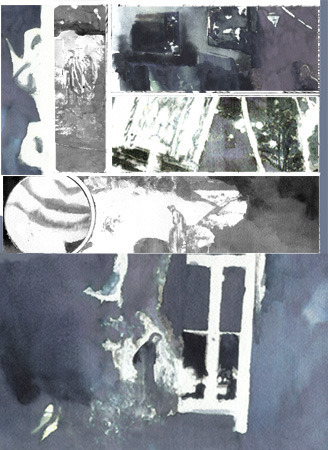
The Inferno Canto I The Forest, The Three Beasts Virgil, 2004
 There's a graphic novel inspired by the Divine Comedy.
There's a graphic novel inspired by the Divine Comedy.http://www.amazon.com/Dantes-Divine-C...
I read parts of it, it's very amusing :)
From purgatory to inferno: Beckett and Dante revisited
“… an urge to shut himself off from the importunities of the world and of his body and to retire into the calm of his mind …” (How many of us are guilty of this?)
The original Belacqua, it bears repeating, was in real life a lute maker of Florence whom Dante had known as notorious for his indolence and apathy. In the poem, he is placed on the second terrace of Ante-Purgatory, the dwelling of the late repentant who only just escaped damnation. Because they delayed their reconcilation with God until the last moment, they are obliged to wait at the foot of the mountain through a time as long as their lives on earth, enduring the indolence in which they used to indulge, before making the ascent that will prepare them for Paradise. Dante’s portrait, which humorously reveals how little this punishment disturbs Belacqua, contains much that Beckett was to use in his later work. The persistent sloth of the figure sitting with his head on his knees out of sight of the heavens that reveal the passing of time; his surly humour; the contrast between mental agility and physical lassitude; the need to live one’s life over again; and the impossibility of moving from where one is until certain preconditions have been fulfilled, are all motifs that recur in the novels and plays, and their presence denotes at first an essentially purgatorial context.
To the early heroes, who all seek what Belacqua appears to have found, ‘a limbo purged of desire,’ this existence in Ante-Purgatory represents an ideal. His namesake in More pricks than kicks is by nature ‘sinfully ignorant, bogged in indolence, asking nothing better than to stay put,’ and if he cannot lie in the shadow of a rock, he finds an acceptable substitute in a ‘lowly public’ where he is not known. He dreams, too, of a life in a lunatic asylum where he believes peace and mental freedom are to be found, for he shares with his successors in Beckett’s fiction an urge to shut himself off from the importunities of the world and of his body and to retire into the calm of his mind, so eliminating as far as possible the dualism that torments his Cartesian thinking. Malone who, dying, goes over his life yet again in fragmentary emulation of Dante’s Belacqua, even speaks of the asylum where he ends his days as ‘a little paradise.’
http://www.english.fsu.edu/jobs/num05...
“… an urge to shut himself off from the importunities of the world and of his body and to retire into the calm of his mind …” (How many of us are guilty of this?)
The original Belacqua, it bears repeating, was in real life a lute maker of Florence whom Dante had known as notorious for his indolence and apathy. In the poem, he is placed on the second terrace of Ante-Purgatory, the dwelling of the late repentant who only just escaped damnation. Because they delayed their reconcilation with God until the last moment, they are obliged to wait at the foot of the mountain through a time as long as their lives on earth, enduring the indolence in which they used to indulge, before making the ascent that will prepare them for Paradise. Dante’s portrait, which humorously reveals how little this punishment disturbs Belacqua, contains much that Beckett was to use in his later work. The persistent sloth of the figure sitting with his head on his knees out of sight of the heavens that reveal the passing of time; his surly humour; the contrast between mental agility and physical lassitude; the need to live one’s life over again; and the impossibility of moving from where one is until certain preconditions have been fulfilled, are all motifs that recur in the novels and plays, and their presence denotes at first an essentially purgatorial context.
To the early heroes, who all seek what Belacqua appears to have found, ‘a limbo purged of desire,’ this existence in Ante-Purgatory represents an ideal. His namesake in More pricks than kicks is by nature ‘sinfully ignorant, bogged in indolence, asking nothing better than to stay put,’ and if he cannot lie in the shadow of a rock, he finds an acceptable substitute in a ‘lowly public’ where he is not known. He dreams, too, of a life in a lunatic asylum where he believes peace and mental freedom are to be found, for he shares with his successors in Beckett’s fiction an urge to shut himself off from the importunities of the world and of his body and to retire into the calm of his mind, so eliminating as far as possible the dualism that torments his Cartesian thinking. Malone who, dying, goes over his life yet again in fragmentary emulation of Dante’s Belacqua, even speaks of the asylum where he ends his days as ‘a little paradise.’
http://www.english.fsu.edu/jobs/num05...
 *looks for new threads to plaster with pictures* This one looks very nice... *makes herself comfortable*
*looks for new threads to plaster with pictures* This one looks very nice... *makes herself comfortable* ;)
I'm reading a book on the Pre-Raphaelite painters. Some of them were inspired by Dante & his Comedy. This one is by Dante Gabriel Rossetti:

Paolo and Francesca da Rimini by Dante Gabriel Rossetti (1855)
http://www.tate.org.uk/art/artworks/r...
http://en.wikipedia.org/wiki/Paolo_an...
 Kalliope wrote: "And I am reading about the Victorians and Proust.. and of course, the PRB are there..."
Kalliope wrote: "And I am reading about the Victorians and Proust.. and of course, the PRB are there..."It's the John Ruskin Connection!
 A couple other paintings by Dante Gabriel Rossetti inspired by Dante (all at Tate Britain):
A couple other paintings by Dante Gabriel Rossetti inspired by Dante (all at Tate Britain):
Dante's Vision of Rachel and Leah (1855)
http://www.tate.org.uk/art/artworks/r...
Based on Purgatorio, Canto XXVII. 94-108
The two women, seated at the fountain in the Earthly Paradise, symbolise the active and the contemplative life. Leah, the active one, works with tendrils of honeysuckle and carries a red rose in her long loose hair. Both flowers had connotations of sexual attraction for Rossetti. She wears a green dress, the colour of life. Rachel is dressed in purple, the colour Rossetti often associates with inactivity and sometimes even with death.
http://www.rossettiarchive.org/docs/s...
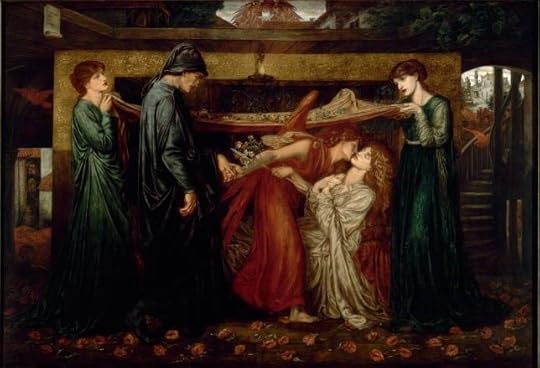
Dante's Dream at the Time of the Death of Beatrice (1869)
Based on Dante's Vita Nuova
http://www.liverpoolmuseums.org.uk/wa...
Rossetti had a life-long interest in the Italian poet Dante. This painting shows an episode from the 'Vita Nuova'. In it Dante dreams that he is led by Love to the death-bed of Beatrice Portinari, the object of his unrequited passion.
This is Rossetti's largest ever painting. In it he creates a visionary world through soft, rich colours and complex symbols. The attendants wear green for hope, while the spring blossoms signify purity. The red doves indicate the presence of love and the poppies symbolise the sleep of dreams and death.
The model for Beatrice was Jane Morris, with whom Rossetti had a long-term affair.
http://www.liverpoolmuseums.org.uk/wa...
An earlier version in watercolor:
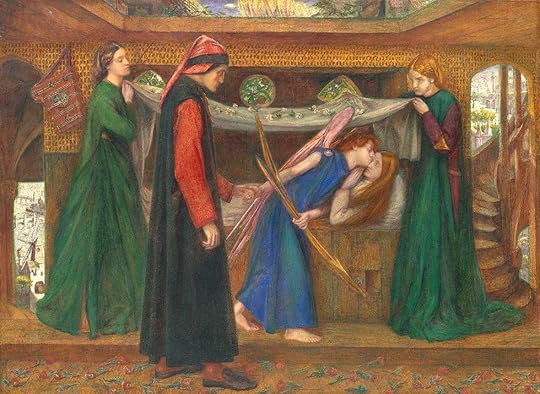
Dante's Dream at the Time of the Death of Beatrice (1856)
http://www.tate.org.uk/art/artworks/r...
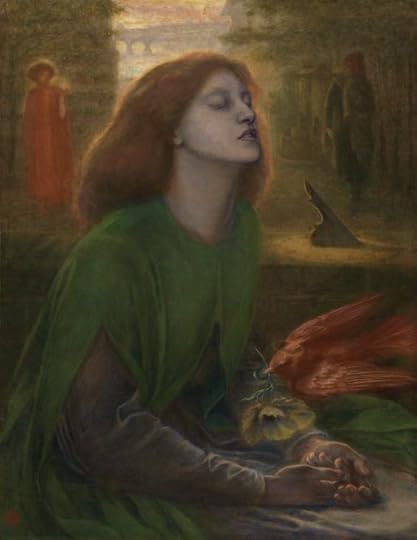
Beata Beatrix (c.1864-70)
http://www.tate.org.uk/art/artworks/r...
Rossetti draws a parallel in this picture between the Italian poet Dante's despair at the death of his beloved Beatrice and his own grief at the death of his wife Elizabeth Siddal, who died on 11 February 1862. The picture is a portrait of Elizabeth Siddall in the character of Beatrice. It has a hazy, transcendental quality, giving the sensation of a dream or vision, and is filled with symbolic references. Rossetti intended to represent her, not at the moment of death, but transformed by a 'sudden spiritual transfiguration.' She is posed in an attitude of ecstasy, with her hands before her and her lips parted, as if she is about to receive Communion.
http://www.tate.org.uk/art/artworks/r...
 Dante Gabriel Rossetti - La Pia de Tolomei (c. 1868)
Dante Gabriel Rossetti - La Pia de Tolomei (c. 1868)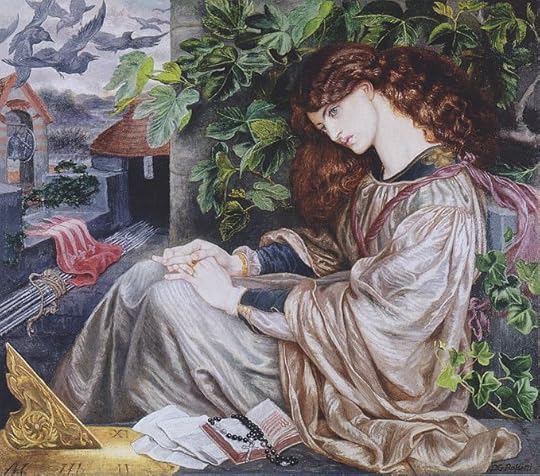
Based on Purgatorio Canto V
La Pia, from the family Tolommei, was unjustly imprisoned by her jealous husband in a castle in Maremma, a marshy region of Tuscany near Sienna, Italy. There she died there under mysterious circumstances.
The model for this painting is Jane Morris, wife of William Morris, a fellow artist and good friend of Rossetti. This is especially meaningful because Rossetti was in love with Jane Morris. He uses this passage from Purgatory to express his own unhappy romantic experiences with a woman who is married to, and in a sense, prisoner of a man she does not love.
http://www.spencerart.ku.edu/educatio...
A good 1-minute audio commentary: http://collection.spencerart.ku.edu/e...
 More by Dante Gabriel Rossetti (& more on his complicated love life!)
More by Dante Gabriel Rossetti (& more on his complicated love life!)
Dantis Amor (1860)
This painted panel decorated one of three cupboard doors that formed the upper part of a large settle belonging to William Morris (1834-96). The subject of all three panels was Beatrice Portinari.
Dantis Amor (Dante's Love) is the central panel, symbolising Beatrice's death, which occurred between the events depicted in the other two panels, The Salutation of Beatrice in Florence and The Salutation in the Garden of Eden (both in the National Gallery of Canada, Ottawa).
The earthly Beatrice in the first panel was modelled on Morris's new wife Jane Burden, with whom Rossetti was also smitten. The heavenly Beatrice in Dantis Amor, however, is modelled on Lizzie Siddal.
The picture is intended to depict Beatrice's death and subsequent union with Christ. The scene is divided diagonally, with the haloed figure of Christ looking down from the top left towards Beatrice, enclosed in a crescent moon and surrounded by stars. The central angel holds a sundial, as yet unfinished, but which, in the preparatory drawing, indicates the number nine, the hour of Beatrice's death. In the drawing Rossetti also inscribed along the line of the diagonal the concluding words of Dante's Divine Comedy: 'L'AMOR QUE MVOVE IL SOLE E L'ALTRE STELLE' [the love which moves the sun and the other stars] (Paradiso xxxiii, l.145). The composition is thus intended to represent not only the death of Beatrice and her transition from earth to heaven, but the wider notion that love is the generating force of the universe.
http://www.tate.org.uk/art/artworks/r...
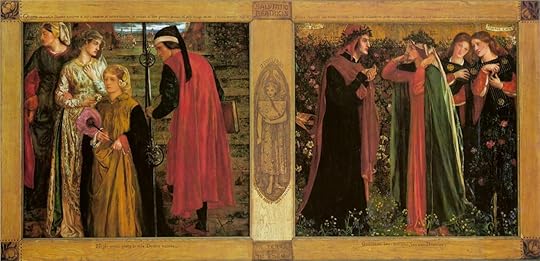
The Salutation of Beatrice (1859-1863)
Big: http://uploads8.wikipaintings.org/ima...
The panels depict scenes from the "Vita nuova" and the "Divine Comedy" by the 13th-century Italian poet, Dante Alighieri: the meeting of Dante and Beatrice in Florence and their meeting after death, in Paradise. The work was conceived as a wedding present for William Morris, whose wife Jane was the model for Beatrice on Earth. Rossetti also designed the frame, incorporating quotations from the poems. Between the two subjects, the death of Beatrice is symbolized by a shadow on the sundial.
http://www.gallery.ca/en/see/collecti...
And this one, recently discovered (!) and auctioned at Christie's in 2012, completes the series:

The Salutation of Beatrice (1869)
A portrait redolent of one of the most famous romances of the Victorian era has surfaced for sale from a private collection in Scotland where it has been, unrecorded and unknown to scholars, for over a hundred years.
Painted in 1869 by the pre-Raphaelite artist Dante Gabriel Rossetti, it represents his muse, Jane Morris, who was married to Rossetti’s business partner, the artist and designer William Morris.
Artist and sitter first met and were attracted to each other in 1857, but as Rossetti was already engaged to Elizabeth Siddall, she married Morris instead. However, after Siddall tragically took her life in 1862, and the Morris marriage appeared to flounder, the relationship was rekindled.
The year 1869 is generally thought to be when Rossetti reconciled his grief for Siddall with his love for Jane Morris. Though gossip levels ran high, lack of documentary evidence has left historians guessing at the degree of intimacy achieved between them.
Each destroyed the correspondence with the other during those crucial years. The title of the painting, ‘The Salutation of Beatrice’, associates Jane with Dante’s Beatrice, the incarnation of beatific love and the object of Dante’s courtly love. A sonnet by Dante pinned to the wall extols the virtues of courtly love: ‘My lady looks so gentle and so pure…’
http://www.telegraph.co.uk/culture/ar...
 Amos Nattini was born in Genoa in 1892 and died in Parma in 1985.
Amos Nattini was born in Genoa in 1892 and died in Parma in 1985. http://etcweb.princeton.edu/dante/pdp...
http://etcweb.princeton.edu/cgi-bin/d...
Another set of Commedia related images available.
 Lily wrote: "Amos Nattini was born in Genoa in 1892 and died in Parma in 1985.
Lily wrote: "Amos Nattini was born in Genoa in 1892 and died in Parma in 1985. http://etcweb.princeton.edu/dante/pdp...
Another set of Commedia related images available."
Very nice!! I'll have to look into it. Tomorrow. You are bad for my reading time Lily! <------ I have to blame someone for playing all day long on GR. ;)
Here's a blog post on Nattini's 1923 book (and in bonus some pictures of a 1491 edition with woodcuts):
http://blogs.princeton.edu/graphicart...
 Sue wrote: "Thank you B.P. for all the Rossetti portraits and Divine Comedy art. I love those."
Sue wrote: "Thank you B.P. for all the Rossetti portraits and Divine Comedy art. I love those.":)
Here's a few more by Rossetti (he was a fan of Dante!):
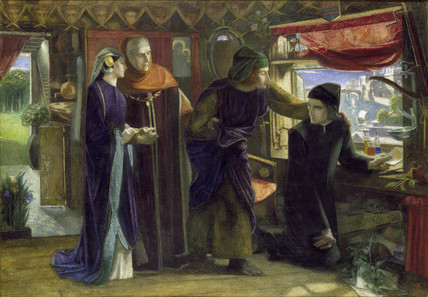
The First Anniversary of the Death of Beatrice
(Alternately titled: Dante drawing an angel) (1853)
Based on Dante's Vita Nuova
This is a watercolour version of the subject Rossetti had treated in 1849. Dante's friends interrupt him as he draws an angel.
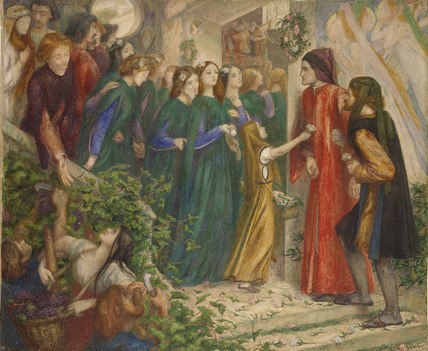
Beatrice at a marriage Feast denying her Salutation to Dante (1855)
This is a close copy of a composition of 1851, the first work in which Elizabeth Siddal serves as the model for Beatrice.
The subject comes from the 'Vita Nuova'. Beatrice, disapproving of Dante's attentions to another woman, refuses to greet him when they meet at a marriage feast. Beatrice does not know that he has only pretended to favour the other woman in order to conceal his purer love for her.
This was one of the 13 subjects from the 'Vita Nuova' that Rossetti had envisaged for pictorial treatment as early as 1848.
http://www.liverpoolmuseums.org.uk/wa...
 William Dyce - Francesca da Rimini (1837)
William Dyce - Francesca da Rimini (1837)
Big: http://www.nationalgalleries.org/medi...
Dyce acknowledged this as one of the finest paintings he produced in Edinburgh. Its subject was inspired by the ill-fated lovers described by Dante in his epic poem 'The Inferno'. Francesca, married to an elderly and deformed husband Giancotto, read to his younger brother Paolo and they fell in love. Giancotto surprised the lovers and murdered them. He was originally included in Dyce's composition. A hint of the tragic outcome is still suggested dramatically by the presence of Giancotto's disembodied hand at the left, a fortuitous result of the canvas trimmed to remove damage in 1882.
http://www.nationalgalleries.org/coll...
 In Melbourne at the National Gallery of Victoria an exhibition has opened with their collection of William Blake watercolor and woodblock prints. These are usually in their storage. There are famous divine comedy prints amongst them.
In Melbourne at the National Gallery of Victoria an exhibition has opened with their collection of William Blake watercolor and woodblock prints. These are usually in their storage. There are famous divine comedy prints amongst them. http://www.ngv.vic.gov.au/whats-on/ex...
It's on until the end of August 2014.
 http://content.ngv.vic.gov.au/col-ima...
http://content.ngv.vic.gov.au/col-ima...I don't recall having seen this one before, from the opening Canto:
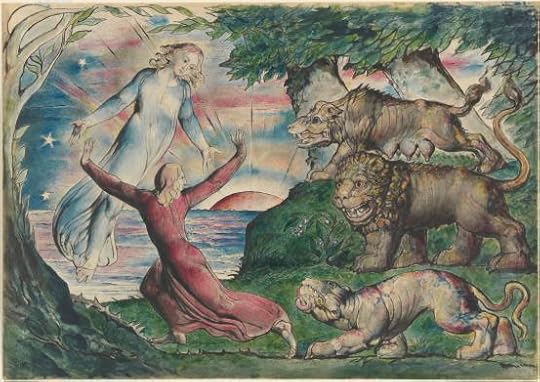
Wow!
 Kerenmcc wrote: "In Melbourne at the National Gallery of Victoria an exhibition has opened with their collection of William Blake watercolor and woodblock prints. These are usually in their storage. There are famou..."
Kerenmcc wrote: "In Melbourne at the National Gallery of Victoria an exhibition has opened with their collection of William Blake watercolor and woodblock prints. These are usually in their storage. There are famou..."This looks amazing! I hope you'll get a chance to go see it. *iz jealous*
Ooh the museum's collection is online. ONE HUNDRED AND TWENTY SIX works by Blake... Thank you for sharing! *verah happy*
http://www.ngv.vic.gov.au/col/artist/...
 Hi Lily and BP
Hi Lily and BPGlad u like them.
I still haven't had a chance to go
I'm very grateful for all the amazing links to visuals
Keren.
 Kerenmcc wrote: "...I'm very grateful for all the amazing links to visuals...Keren."
Kerenmcc wrote: "...I'm very grateful for all the amazing links to visuals...Keren."I hope you get to go, Keren! I had learned about the collection there previously, but it feels to me as if they may have upgraded the online interfaces as they have prepared this exhibition. I didn't recall the one I posted @32, but it may have been accessible, but I was already beyond the beginning of Commedia when I started using the site. So again, THANKS. It is exciting to know about the exhibition.
 Is there no way of attaching a photo? There are some pictures from the William Blake exhibition that are not on the NGV site!
Is there no way of attaching a photo? There are some pictures from the William Blake exhibition that are not on the NGV site!
 Kerenmcc wrote: "Is there no way of attaching a photo? There are some pictures from the William Blake exhibition that are not on the NGV site!"
Kerenmcc wrote: "Is there no way of attaching a photo? There are some pictures from the William Blake exhibition that are not on the NGV site!"If you upload your photo to some site, you can then use the image feature from the "some html" drop-down list. I don't know if just loading to your profile page and linking from there might work -- anyone else know?
 Thanks Lily. I think there is a photo upload button for the group but it doesn't seem to link with any particular stream.
Thanks Lily. I think there is a photo upload button for the group but it doesn't seem to link with any particular stream.I'm wondering if this works for now. I'll add more of my favourites as i have time.
http://www.pinterest.com/kerenmcc/dan...
 Did you go see the exhibition? Lucky you. :)
Did you go see the exhibition? Lucky you. :)Nice pinterest page. I didn't know Moebius has done Dante! I'm going to look for his book...
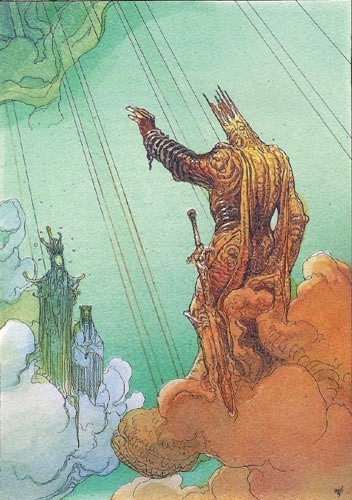
{To paste pictures you go into the (some html is ok) above the comment box, copy the html for an image & paste it in the comment box then paste the picture address inside the html. :)}
 Book Portrait wrote: "{To paste pictures you go into the (some html is ok) above the comment box, copy the html for an image & paste it in the comment box then paste the picture address inside the html. :)} ...
Book Portrait wrote: "{To paste pictures you go into the (some html is ok) above the comment box, copy the html for an image & paste it in the comment box then paste the picture address inside the html. :)} ...BP -- But the picture (photo) has to be someplace on the Net first!?!
 Lily wrote: "BP -- But the picture (photo) has to be someplace on the Net first!?! "
Lily wrote: "BP -- But the picture (photo) has to be someplace on the Net first!?! "Lol. You're right. I wasn't fully awake when I replied to your & K's posts! :) I thought K was wondering how to link/paste a picture from pinterest.
But yes it's possible to upload a photo in the Photos area of the group (click the "add more photos"):
https://www.goodreads.com/photo/group...
and then to link the uploaded picture in a comment like any other picture from the net.
I had to do it for a screen cap I took of the Lambeth Apocalypse: https://www.goodreads.com/photo/group...
Mmm. I hope that answers the question. Explaining internet stuff is not my strong suit. ;)
 Finally found more info on the Moebius illustrations of Paradiso (19 in all). They were published in an Italian edition in 2006:
Finally found more info on the Moebius illustrations of Paradiso (19 in all). They were published in an Italian edition in 2006:

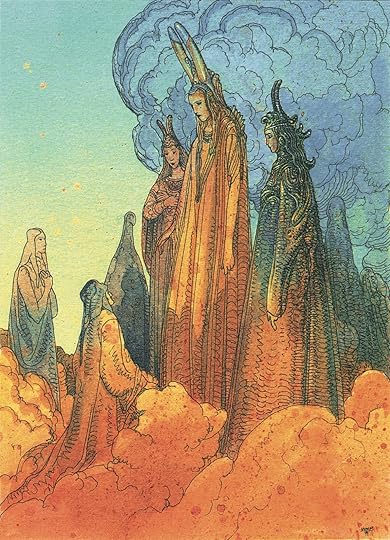
http://dantereader.tumblr.com/tagged/...
Publisher's page:
http://www.nuages.net/autori.asp?auto...
Apparently the other two volumes were not illustrated by Moebius but by two different artists:
- Inferno illustrated by Lorenzo Mattotti
- Purgatorio by Milton Glaser
http://www.exibart.com/notizia.asp?ID...
 While browsing I stumbled upon the illustrations done by Franco Ferraris, which look like a colorised version of the Doré illustrations:
While browsing I stumbled upon the illustrations done by Franco Ferraris, which look like a colorised version of the Doré illustrations: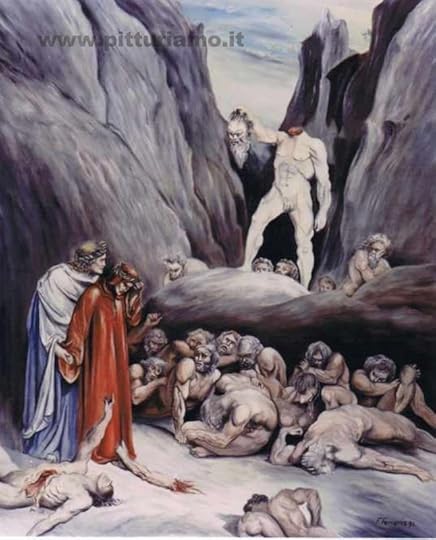
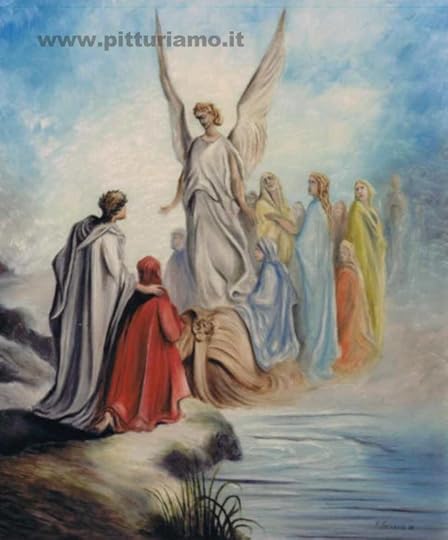

http://www.pitturiamo.it/Franco-Ferra...
They kinda look kitsch like this...
 It's true that it is usually better to see a picture in it's original dimensions.
It's true that it is usually better to see a picture in it's original dimensions. Also, that last Ferraris picture i find more disturbing than inspiring!
Like the colony of fruit bats down near the river…
I love the Moebius pictures with women as radiant strong characters
but still it doesn't seem many artists have really gone with the cosmic circling of planets and stars and have focussed in on particular characters in a more traditional heavenly cloudy sky.
And they haven't gone with an earthy version of 'heaven on earth' which i thought Blake hinted at in the rose sketch.
 I'm so glad to see the Blake exhibition in Melbourne (and know it is not possible for most in this group) but if I had my choice I would rather see the current Frankfurt exhibition of the Divine Comedy with African contemporary artists!
I'm so glad to see the Blake exhibition in Melbourne (and know it is not possible for most in this group) but if I had my choice I would rather see the current Frankfurt exhibition of the Divine Comedy with African contemporary artists!Fortunately there is a video of interviews with curators at this link which can give a sense of it without needing to be there: http://www.mmk-frankfurt.de/en/ausste...
Beatrice is African.
The curator, Simon Njami, asks why is hell down and paradise up?
He likes the idea of climbing up for hell.
What does paradise look like for people of different backgrounds?
I find this art powerful contextualising.
 Kerenmcc wrote: "...but if I had my choice I would rather see the current Frankfurt exhibition of the Divine Comedy with African contemporary artists!..."
Kerenmcc wrote: "...but if I had my choice I would rather see the current Frankfurt exhibition of the Divine Comedy with African contemporary artists!..."My fantasy has been and continues to be an hour or two with a curator speaking about one or more of the drawings by Sandro Botticelli.
 Lily wrote: "Kerenmcc wrote: "...but if I had my choice I would rather see the current Frankfurt exhibition of the Divine Comedy with African contemporary artists!..."
Lily wrote: "Kerenmcc wrote: "...but if I had my choice I would rather see the current Frankfurt exhibition of the Divine Comedy with African contemporary artists!..."My fantasy has been and continues to be a..."
You would love Sandro Botticelli: The Drawings for Dante's Divine Comedy. Each drawing is reproduced on one large page and the facing page has a detailed commentary. ^^
 Kerenmcc wrote: "It's true that it is usually better to see a picture in it's original dimensions.
Kerenmcc wrote: "It's true that it is usually better to see a picture in it's original dimensions. Also, that last Ferraris picture i find more disturbing than inspiring!
Like the colony of fruit bats down near t..."
Lol. Fruit bats in paradise! I really like the Moebius too. I haven't seen all the Paradiso drawings yet, and it looks like Blake only did the last few cantos but it'll be interesting to see how he created the more mystical spheres... A tall order for any artist. Dali might have something very creative too... We'll see! :)
 Book Portrait wrote: "You would love Sandro Botticelli: The Drawings for Dante's Divine Comedy. Each drawing is reproduced on one large page and the facing page has a detailed commentary...."
Book Portrait wrote: "You would love Sandro Botticelli: The Drawings for Dante's Divine Comedy. Each drawing is reproduced on one large page and the facing page has a detailed commentary...."Yes, all $200 worth of it! Wonder to whom I might bequeath it where it would be appreciated and used. (It would be less expensive than a trip to Berlin or Rome, I'll grant that! [g]) I believe I looked for a copy on World Cat once and didn't find one within access -- but I should try again.
 If it is of any value to you, several of the Paradiso illustrations can be found here:
If it is of any value to you, several of the Paradiso illustrations can be found here:https://www.goodreads.com/topic/group...
Books mentioned in this topic
Sandro Botticelli: The Drawings for Dante's Divine Comedy (other topics)Rauschenberg: Art and Life (other topics)








http://www.worldofdante.org/gallery_m..."
A rather good one! Kalliope may be able to report on Giotto,Dante and the Scrovegni Chapel.
http://arthistorybootcamp.wordpress.c...
http://heidenkind.blogspot.com/2009/0...